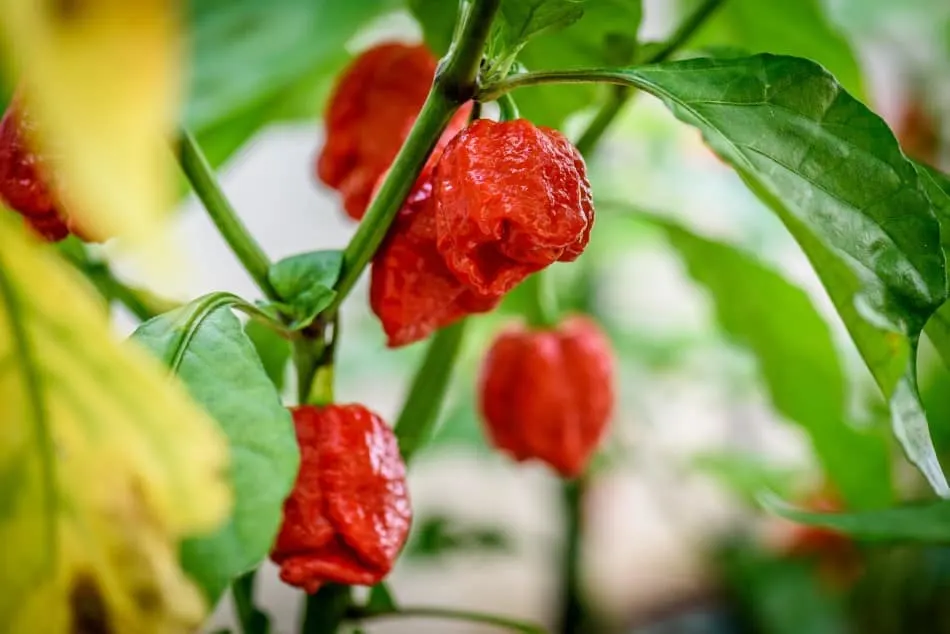Thinking about growing your own peppers but unsure about the amount of care needed? Or perhaps, you’ve already tried to grow pepper plants in the past, but they didn’t turn out so well because you weren’t sure how often to water them. Or maybe you’re just curious about how much water a pepper plant needs.
Most pepper plants need to be watered twice a week, but it will depend on the type of pepper you’re growing. A good general rule when deciding how much water your pepper plant needs is to moisten soil up to 6 inches by gradually adding water.
Here is a list of 15 popular pepper plants and a general idea of how often you should water them:

That covers some of the most common types of peppers, but there’s even more you should know when it comes to keeping your pepper plants properly watered and healthy. We’ll discuss the ideal amounts of water needed, how the environment affects how much water is needed, and some general tips for knowing when and how to water your peppers.

Do Pepper Plants Need Plenty of Water?
There is no definitive answer to this question because not only are there many types of peppers, but the way you grow them also impacts their water needs.
The exact amount of water a pepper plant needs varies depending on three key factors:
- Growing environment (indoor vs outdoor)
- Season and climate
- The soil and container
There are some good rules of thumb when it comes to watering pepper plants. It is best to water pepper plants in the morning as the sun can dry out the water before the plant has an opportunity to fully absorb it. Do not water pepper plants at night as you might risk overwatering them as it is hard to see how much water you are giving them in the dark.
What Is the Ideal Amount of Water a Pepper Plant Needs?
The ideal amount of water for a pepper plant is going to vary depending on the species, location, and condition of the plant. To understand your pepper plant’s water needs, it’s better to learn the signs of when the soil is likely too dry for your pepper.
Before watering your pepper plants, always check the soil’s moisture. Most peppers only need to be watered if the soil is dry to the touch. A good general rule is to moisten soil up to 6 inches by gradually adding water. A common test is to use a pencil to check: Stick a pencil down into the soil. If the pencil tip is dry when removed, give your pepper plant some more water. Repeat this step until you feel the tip of the pencil get moist.
Do Pepper Seeds Need Plenty of Water to Grow?
You don’t need a whole lot of water for pepper seeds to germinate. Getting the adequate amount of light and heat on your planted seeds is more critical to the success of germination. Just remember that the whole process of germination takes an enormous amount of patience to succeed.
If you are interested in growing pepper plants from seeds, many experts recommend planting 8 to 10 weeks before the last frost date.
Pepper expert Cayenne Diane says:
“Before you plant your seeds, soak them overnight in warm water. I’ve grown seeds with and without soaking, and I found the ones I soaked did a better job of sprouting.”
Plant them indoors in peat pellets the following morning. A peat pellet is dehydrated peat enclosed in a mesh that expands when water is poured over.
If you want to see a video tutorial on how to grow peppers from seed to harvest, here is a detailed YouTube video by CaliKim29 Garden & Home DIY.
Do Pepper Plants Need More Water If Grown in Pots?
If you are planning to grow your pepper plants in pots, it is important to know that pepper plants in pots will require more frequent watering than those planted directly in the ground.Watering once a day may be sufficient when the temperature ranges from 65 to 80oF. But when the temperature rises beyond 80oF, there is a good chance that you will need to water your pepper plant twice a day.
For those who live in areas with unpredictable weather, this might be your best bet as you can temporarily move young pepper plants indoors when heavy rain is in forecast. If you have larger potted pepper plants that can’t be moved, you might consider creating a tarp-like covering to protect them from getting too much water. If that is not an option, consider making sufficient holes in the pot that can drain water efficiently which can help prevent your plants from getting overwatered.
To achieve the best growing conditions for your pepper plants, the three aspects to look for when choosing a pot for your pepper plants are:
- Size
- Depth
- Type of material
Choose a pot that’s at least 12 inches in diameter and 14 inches deep for their roots to grow and spread well. Two-gallon to five-gallon pots are the appropriate sizes depending on the type of pepper plant. Avoid terracotta pots as they tend to drain water excessively, causing the soil to lose its moisture.
Remember, a well-drained yet moist soil is the perfect setup for pepper plants to thrive!
What Happens If You Overwater Pepper Plants?
It is without a doubt that water plays an essential role in growing good quality peppers. However, overwatering your pepper plants can negatively impact both the quality and quantity of peppers that your plants can produce.
A very clear indication that you have overwatered your plants is the discoloration (yellowing or wilting) of the leaves accompanied by a droopy or limp appearance. Overwatering deprives the plants of oxygen, which causes the roots to eventually decay and then lose their function of keeping the whole plant healthy.
Here are some tips to avoid overwatering:
- Check the moisture level of the soil before you water the plants, only watering if the soil is dry
- Do not water your pepper plants if it is raining or will rain
- Place pepper plants in containers with drilled holes to combat water accumulation during heavy rains
What Happens If You Underwater Pepper Plants?
If you reside in an area where temperatures are hot and dry, you should pay more attention to the signs of underwatering pepper plants.
Leaves that are brittle to the touch and soil that’s starting to pull away are good indicators of underwatered pepper plants. The good news is it’s easier to reverse the effects of underwatering than overwatering. Just water them and they will likely recover.
Dry Them Out and Turn Up the Heat!
Some gardeners intentionally underwater pepper plants because capsaicin tends to be more concentrated when a pepper plant is stressed and deprived of water. Capsaicin is a chemical substance naturally present in some peppers that is responsible for the pungent taste (a.k.a. hot burning sensation) that we experience when eating peppers.
However, the technique of underwatering often yields fewer fruits as this puts the plant under immense stress. Just remember to weigh your options before deciding to go this route.
Conclusion
Water plays a vital role in the growth of pepper plants. Most pepper plants only need to be watered once or twice per week but that may vary depending on other factors such as temperature, container, fertilizer, and soil. Overwatering your pepper plants is one thing you should avoid doing as it can have major effects on the quality and quantity of the peppers you grow.
Here are Some of my Favorite Gardening Products and Tools
Thank you for reading this article. I hope you found it helpful for growing some new plants in your home or garden. Here are some products I like that I hope you’ll also find helpful. These are affiliate links, and I am compensated for referring traffic. But in all honesty, these are the exact product that I use or recommend to everyone.
Soil: For high-quality soil, I really like Fox Farm Ocean Forest. I do all my growing in containers and this soil has worked great for me. I like how they use nutrient-rich contents like earthworm castings, bat guano, and composted crab and fish.
Fertilizer: Currently I am using a seaweed-based organic fertilizer call Neptunes Harvest. This is a great milder fertilizer option if you want to use something organic. If you want a more powerful fertilizer, I recommend Fox Farm Liquid Nutrient Trio, lots of people have had great growing success with this product.
Pruning Shears: Pruning shears are one of the most useful gardening tools to have because it’s important to prune your plants to keep them healthy. The pruning shears I recommend are the Gonicc 8’’ pruning shears. I like them because they are built sturdy and work both on bigger and smaller plants, so you don’t need to have multiple pruning shears.
spicytrio.com is a participant in the Amazon Services LLC Associates Program, an affiliate advertising program designed to provide a means for sites to earn advertising fees by advertising and linking to Amazon.com. spicytrio.com also participates in affiliate programs with other sites. spicytrio.com is compensated for referring traffic and business to these companies.
